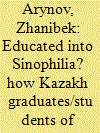| Srl | Item |
| 1 |
ID:
192987


|
|
|
|
|
| Summary/Abstract |
This article examines perceptions of China and contributes to the ongoing academic debate on Sinophobia in Central Asia. However, unlike existing studies, it specifically focuses on perceptions of those, who have first-hand China experience – Kazakh students/graduates of Chinese universities. Based on in-depth interviews with them, the article argues that those with first-hand China experience tend to reject the China threat theory, found to be widespread among the general population. Instead, China-educated Kazakh youth perceive China mostly as an economic opportunity for their own country. Yet, this does not necessarily make them Sinophiles in the sense that they still express certain concerns related to their country’s potential over-dependence on China. But more interestingly, they see China as the “civilizational other.” This perceived civilisational abyss even among the more-informed segments of the population appears to be one of the main causes of the alienation of China and the Chinese in Kazakhstan.
|
|
|
|
|
|
|
|
|
|
|
|
|
|
|
|
| 2 |
ID:
186038


|
|
|
|
|
| Summary/Abstract |
As a major external actor, the European Union prioritises its normative agenda while interacting with Central Asia. This article scrutinises how the very notion of ‘European values’ and the promotion of these values by the European Union are perceived by intermediate elites in Kazakhstan. The article argues that Kazakh opinion-makers distinguish between ‘European’ political values and cultural values. Based on how these two dimensions are interpreted, three categories of perceivers are identified and discussed in detail: ‘opponents’, ‘moderate supporters’ and ‘ardent supporters’ of the EU normative policies. The article also discusses some of the factors shaping those perceptions.
|
|
|
|
|
|
|
|
|
|
|
|
|
|
|
|
| 3 |
ID:
190178


|
|
|
|
|
| Summary/Abstract |
In Central Asia the European Union (EU) positions itself as a benign and gentle actor with no geopolitical intentions. But is this self-prescribed image of a ‘force for good’ shared by Central Asians? To answer this question, the article scrutinizes whether the EU is perceived as posing a threat to or offering an opportunity in Kazakhstan and Kyrgyzstan. Theoretically it is argued that the EU cannot unilaterally claim a certain role in the region; rather, perceptions held by Central Asians partly determine what kind of actor the EU can be and what kind of policies it can successfully implement. The article finds that opportunity/threat perceptions are highly issue specific. Depending on a particular issue area, the EU’s image may change from that of an opportunity to a threat, or vice versa. Yet, the opportunity aspect visibly prevails in both countries, which can be regarded as the EU’s comparative advantage vis-à-vis other actors in the region.
|
|
|
|
|
|
|
|
|
|
|
|
|
|
|
|